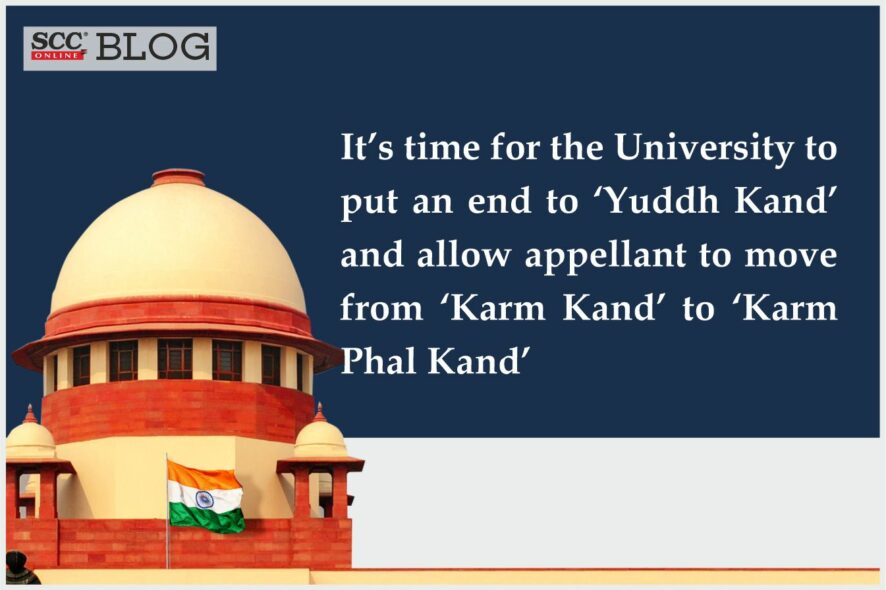Supreme Court: The Division Bench of Hemant Gupta and V. Ramasubramanian*, JJ., reversed the impugned order of the Allahabad High Court holding that where no particular qualification, particularly Master’s Degree in ‘Karm Kand’ was prescribed for the post of Lecturer in ‘Karm Kand’ either by the University Statute or in the advertisement, candidature of the appellant could not be rejected for not holding a Master’s degree in ‘Karm Kand’.
Opining that the appellant’s rejection was a result of stale relationship of the Chancellor and the Vice-Chancellor, the Bench commented,
“…perhaps the entire selection process undertaken in 2006 by the University, became victims of the crossfire between the Chancellor and the Vice-Chancellor.”
Background
In the instant case, the appellant had approached the Court to assail the impugned order of the Allahabad High Court, which had dismissed his writ petition seeking to quash an order of the Chancellor of the Mahatma Gandhi Kashi Vidyapeeth University, rejecting his request to be appointed as Lecturer (Karm Kand). Admittedly, the appellant was engaged as a Guest Lecturer on remuneration from the year 2006 and ever since, he had been teaching students undergoing a one year diploma course in ‘Karm Kand’ for the past nearly 16 years.
Noticeably, the University had invited applications for appointment to the post of lecturer in “Karm Kand”. The genesis of the dispute was that though the Selection Committee had recommended the appellant’s name for appointment but the Executive Council disagreed on the ground that the Vice-Chancellor failed to request the Chancellor to nominate subject experts in the Selection Committee. Hence, initial objection was that the Selection Committee did not include the subject experts nominated by the Chancellor.
Issue before the High Court
Noting that there were no subject experts in ‘Karm Kand’, as no University was offering a specific course in ‘Karm Kand’, the High Court remanded the matter back to the Chancellor to ascertain whether subject experts were actually available and whether the failure of the Vice Chancellor to seek nomination of such experts from the Chancellor vitiated the whole process. Finding that the answer to the said question was too difficult to be provided, the Chancellor went on a detour to find out what are the differences between the subject of Sanskrit and the subject of ‘Karm Kand’. Consequently, the Chancellor held that the appellant did not hold a Master’s degree in ‘Karm Kand’; hence he did not possess the prescribed qualifications for appointment.
Analysis and Findings
Contrary to the order of the Chancellor, the Bench noted that the advertisement did not specify particularly that a candidate applying for the post of Lecturer in ‘Karm Kand’ should hold a Master’s Degree in ‘Karm Kand’. Similarly, the University Statutes did not prescribe any specific qualifications necessary for appointment to the post of Lecturer in ‘Karm Kand’, hence the Bench opined that in the absence of any specific prescription, the University ought to have referred the question of what constitutes relevant subjects, before the process of selection began. Further, the Bench observed that neither the University nor the Chancellor took a stand in the first instance that the appellant was not qualified in the “relevant subject”.
Considering that no candidate was available with a post graduate degree in ‘Karm Kand’ and the Selection Committee which comprised of a representative of the Department of Sanskrit found the appellant to possess a Master’s degree in the relevant subject. Another development that strengthen the case in favour of the appellant was that the Department of Sanskrit by a subsequent meeting had apprised that the Academic Qualification of the Karm Kand and for the post of Professor of Sanskrit be kept one and the same as well as the Specialized experience of karm kand be stipulated as compulsory which was passed unanimously.
Verdict
In the backdrop of above, the Bench opined that dismissal by the High Court was clearly erroneous. The Bench commented,
“…it is time for the University to put an end to this ‘Yuddh Kand’ and allow the appellant to move from ‘Karm Kand’ to ‘Karm Phal Kand’.”
Consequently, the appeal was allowed and the impugned order was set aside. The University was directed to regularize the services of the appellant.
[Dinesh Chandra Shukla v. State of U.P., 2022 SCC OnLine SC 353, decided on 24-03-2022]
*Judgment by: Justice V. Ramasubramanian
Appearance by:
For the Petitioner: Advocate Sneha Kalita
For the Respondents: Advocates Sandeep Devashish Das, Sanjay Kumar Tyagi and Kamakshi S. Mehlwal
Kamini Sharma, Editorial Assistant has put this report together






